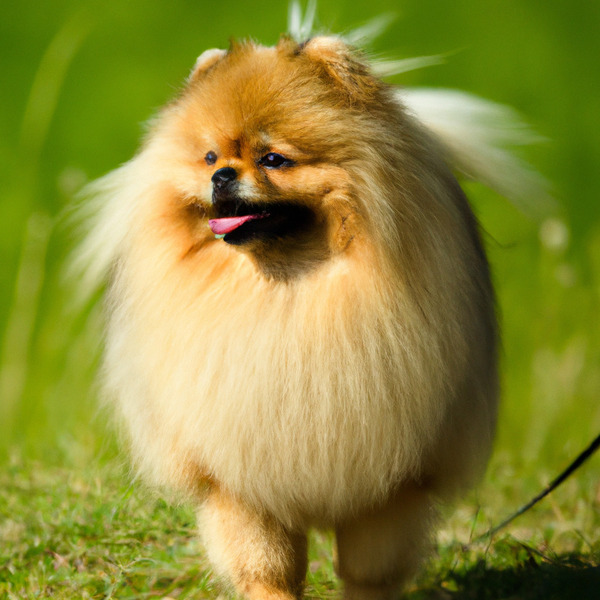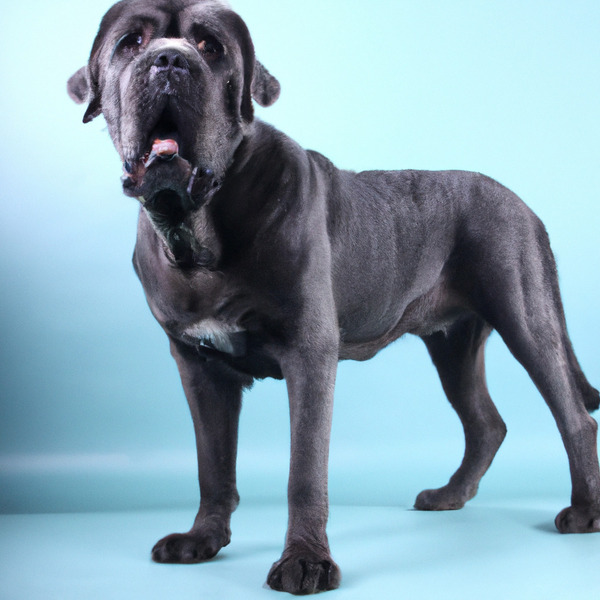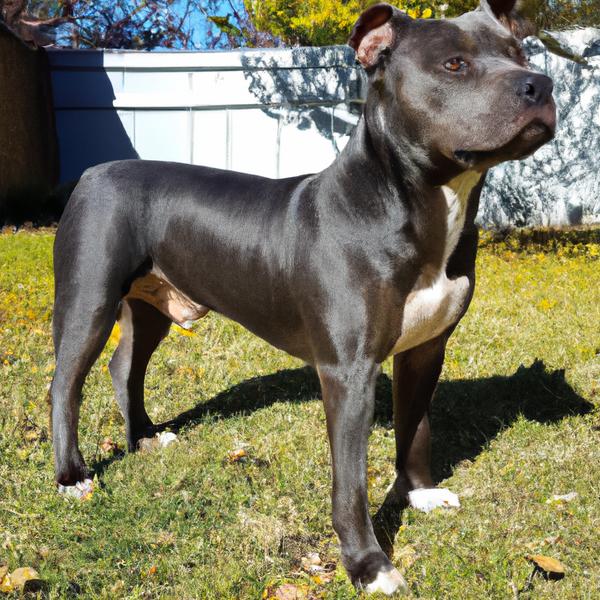Bullypit vs. Rotterman: Breed Differences and Similarities
Hypoallergenic
Are Bullypits or Rottermans hypoallergenic, or neither?
Unfortunately, neither Bullypit nor Rotterman are hypoallergenic, which may not make them the best choice for dog lovers who suffer from pet allergies.
Temperament
What are the personalities of Bullypit and Rotterman dogs?
Loving
Stubborn
Clownish
Energetic
Alert
Courageous
Intelligent
Friendly
Affectionate
Obedient
Loyal
Gentle
Going
Social
Strong
Willed
Aggressive
Independent
Energetic
Protective
Alert
Courageous
Intelligent
Obedient
Loyal
Fearless
Good-natured
Shedding Level
Do Bullypits shed more than Rottermans, or which breed sheds more, Bullypits or Rottermans?
Bullypit or Rotterman dogs are not heavy shedders, but they will lose a significant amount of hair each year. To decrease the amount of shedding, you can regularly brush your Bullypit or Rotterman. This will remove loose hair and keep their coat growing in the same direction.
Watchdog Ability
Which dog breed makes a better watchdog, the Bullypit or Rotterman?
Bullypits aren't great guard dogs; they tend to just watch without taking action.
Choose a Rotterman if you want a top-notch watchdog. This breed takes guarding seriously, and may not require much training, though obedience or guard dog training can improve their skills.
Origin
What is the origin of Bullypit and Rotterman dog breeds?
United States
United States
Ancestry
What are the origins of Bullypit and Rotterman breeds?
American Pit Bull Terrier, American Bulldog
Doberman Pinscher and Rottweiler
Date of Birth
When were Bullypit and Rotterman breeds first developed?
2005
Unknown
Litter Size
What is the usual litter size for Bullypit and Rotterman?
A Bullypit can have a litter of 5-8 puppies on average. However, it's worth noting that the size of the litters can vary greatly. Factors that can influence litter size include the health of the mother, breeding history, and genetics.
A Rotterman can have a litter of 8-12 puppies on average. However, it's worth noting that the size of the litters can vary greatly. Factors that can influence litter size include the health of the mother, breeding history, and genetics.
Adaptability
The adaptability of Bullypit and Rotterman dogs is a well-known trait. They are known for being able to adjust well to different living environments and lifestyle changes.
Health Issues
Between Bullypit and Rotterman, which breed is more prone to health problems?
Bullypits are susceptible to health issues like all breeds, so it's important to monitor their health and seek veterinary care when needed.
Rottermans typically have low vet costs due to their good health, but it's important to monitor their health and seek vet care when necessary.
Major Concerns
What are the major health concerns for Bullypit and Rotterman breeds?
Hip And Elbow Dysplasia
Canine Hip Dysplasia (Chd)
Von Willebrand's Disease
Hypothyroidism
Mitral Valve Dysplasia
Gastric Dilation Volvulus (GDV) or Bloat
Joint Dysplasia
Minor Concerns
What minor health issues should be kept in mind when owning Bullypit and Rotterman?
Demodectic Mange
Cataract
Lysosomal Storage Disease
Skin Allergies
Eye Infections
Occasional Tests
What occasional tests are recommended for Bullypit and Rotterman breeds?
Eye
Hip
Skeletal
Skin Scraping
X-Rays
Electrocardiogram
Buccal Mucosal Screening
Regular Full Physical Examination By Veterinarian
Coagulation Assay
Blood Glucose Tests
Complete Ophthalmologic Examination
Blood Work and Serum Chemistry Tests
Skin Biopsy or Intradermal Tests for specific allergies
Urinalysis and Urine Culture
Energy
How do the energy levels of Bullypits and Rottermans compare?
Bullypits are suitable for those with a balanced lifestyle as they have an average energy level.
Rottermans' high energy levels make them unsuitable for a low-key dog, choose accordingly.
Social Needs
Bullypit vs Rotterman social needs comparison
Bullypit and Rotterman have above average social needs compared to other breeds. They thrive in environments where they have a lot of interaction with humans and other dogs.
Exercise Needed
Bullypit vs Rotterman exercise need comparison.
The Bullypit and Rotterman breeds need significant physical activity to maintain a healthy lifestyle. They are well-suited for those who lead an active lifestyle and enjoy activities such as running, hiking, or other outdoor pursuits.
Sleeping Need
Which of the two sleeps the most/least: Bullypit or Rotterman?
Bullypit and Rotterman breeds are known to have moderate energy levels and normal sleep patterns, typically sleeping around 12-14 hours per day.
Tendency to Bark
Do Bullypits or Rottermans bark more/less frequently?
Bullypit dogs are generally less vocal than other breeds and only bark when necessary, such as to alert their owner or communicate.
The Rotterman is a vocal breed that frequently barks and howls, and may not be suitable for those seeking a quiet companion.
Mouthiness
Mouthiness Comparison: Bullypit vs Rotterman?
Roaming urge
Bullypit vs Labrador: Running away tendency?
Prey Drive
Bullypit or Rotterman - which breed has a higher level of prey drive?
Past times
What are some enjoyable activities and ways to keep Bullypit and Rotterman entertained?
Catch treats, Catchingas, Dog Parks, Walking, Tug-of-war, Jogging, Play, Run, Fetch, Training, Family events, Cuddles, Running, Wrestling, Walks, Tug of war, Chase, Cuddle, Bicycle, Aport, Swimming, Car driving, Swim, Ball, Go to Park, Sleeping, Hide & Seek, Chew, Bite, Eating Snacks
Walk, Chasing around, Walking, Playing Ball, Dog Parks, Jogging, Dawn trotting, Catch treats, Tug-of-war, Fetch, Sleeping, Guard dog, Hide & Seek, Road trip, Cuddle, Run, Car rides, Beach, Fishing, Camping, Walks, Tug of war, Ball, Lots of pats, Training, Swimming, Hike, Frisbee
Activity Level
Which breed has higher energy, Bullypits or Rottermans?
Bullypits are medium-energy dogs and typically enjoy socializing and playing casual or even sustained games of chase with other dogs. They may also have occasional periods of barking or racing around the house.
Rottermans are high-energy dogs. They need mental as well as physical exercise. These dogs require a lot of your involvement and without it they can, and will, become problematic dogs.
Tolerance of being left alone
Grooming
Which breed is easier to maintain in terms of grooming, Bullypits or Rottermans?
The Bullypit is a low-maintenance breed that doesn't require much grooming.
The Rotterman has low grooming needs and is easy to maintain.
Brushing Frequency
What is the recommended brushing frequency for Bullypit and Rotterman dogs?
Bullypit and Rotterman should be brushed at least once a week. Of course, you can give them more frequent brushes if you find that they are still shedding a lot.
Intelligence
Comparing Intelligence: Bullypits vs Rottermans
Bullypits are average in obedience intelligence but have a high IQ and may cause trouble if left unsupervised.
Rotterman is highly intelligent and very trainable.
Sensitivity Level
How do Bullypit and Rotterman compare in sensitivity?
This breed is sensitive and requires gentle handling and a calm home environment.
This breed is sensitive to its environment and best suited for patient and understanding families with a consistent routine.
Affection Dependance
Which is the more affectionate dog breed: Bullypit vs Rotterman?
Apartment Friendly
Which breed is more apartment-friendly: Bullypit or Rotterman?
Bullypits are good apartment dogs as long as they get enough exercise and stimulation outside of the apartment.
The Rotterman is a great apartment dog, thriving with sufficient exercise and time outside as part of their daily routine.
Child Friendly
Do Bullypits or Rottermans have a friendlier temperament towards children?
Bullypits are good with kids if socialized and trained from a young age.
Rottermans have an average level of friendliness towards children.
Senior-friendly
Which dog is more suitable as a pet for the elderly - Bullypit or Rotterman?
Cat Friendly
Do Bullypit or Rotterman breeds have a better compatibility with cats?
Bullypits are somewhat cat friendly and can be trained to get along with cats.
Rottermans are average in their friendliness toward cats and tend to do well with them, especially if raised together.
Dog Friendly
Which breed is more sociable with other dogs: Bullypit or Rotterman?
Bullypits and Rottermans are below average dog friendly dogs. Bullypits and Rottermans may not always get along well with other dogs they have not been raised with.
Pet friendly
How do Bullypit or Rotterman dogs interact with other pets?
Stranger Friendly
Which breed is more friendly with strangers: Bullypit or Rotterman?
Bullypits are averagely friendly around strangers but benefit from early socialisation.
Rottermans are not very stranger friendly.
Playfulness
Which breed is more playful between Bullypit and Rotterman?
Bullypits are a playful breed that needs daily playtime to be happy.
Rottermans have an average level of playfulness, enjoying playtime like most dogs but not excessively so.
Trainability
How do the trainability levels of Bullypits and Rottermans compare?
Bullypit and Rotterman dogs are known for their ease of training and ability to learn quickly, making them a popular choice for pet owners and trainers alike.
Compare Bullypit with other breeds

French Bull Jack
Bullypit vs French Bull Jack

Standard Schnauzer Chin
Bullypit vs Standard Schnauzer Chin

Alaskan Malamute
Bullypit vs Alaskan Malamute

Dameranian
Bullypit vs Dameranian

Border Collie Pyrenees
Bullypit vs Border Collie Pyrenees

French Bulldog
Bullypit vs French Bulldog

Icelandic Sheepdog
Bullypit vs Icelandic Sheepdog

Smooth Fo-Chon
Bullypit vs Smooth Fo-Chon

Neapolitan Mastiff
Bullypit vs Neapolitan Mastiff

Yorkinese
Bullypit vs Yorkinese

Cocker Pug
Bullypit vs Cocker Pug

Coton Chin
Bullypit vs Coton Chin

